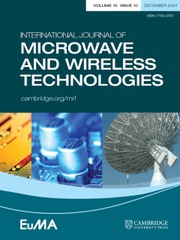Low profile dual band-stop super wideband printed monopole antenna with polarization diversity
Published online by Cambridge University Press: 05 March 2019
Abstract
A low profile super-wideband polarization diversity printed monopole antenna with dual band-notched characteristics is presented the first time. The designed antenna comprises two arched shaped radiating elements with two triangular tapered microstrip feed lines (TTMFL) and two arched shaped partial ground planes, which covers an enormously wide impedance bandwidth (BW) from 1.2 to 25 GHz (ratio BW of 20.8:3) for reflection coefficient |S11| < −10 dB. To ensure the high port isolation (better than − 30 dB) between two feeding ports over the whole bands, two analogous antennas have been kept perpendicular to each other at a distance of 1 mm. In addition, the dual band-notched performance in wireless local area network (5–6 GHz) and X-band (7.2–8.5 GHz) is generated by employing a pair of open-circuited stubs (L-shaped stub and horizontal stub) to the TTMFL. Envelop correlation coefficient has been computed to study the polarization diversity performance. Finally, the proposed antenna was fabricated and tested successfully. Measured results indicate that the proposed antenna is an appropriate candidate for the polarization diversity applications. The proposed antenna has a compact size of 40 × 70 × 0.787 mm3, high isolation, and occupies a small space compared with the existing antennas.
Keywords
- Type
- Antenna Design, Modelling and Measurements
- Information
- International Journal of Microwave and Wireless Technologies , Volume 11 , Special Issue 7: MIKON 2018 / EuMW 2018 (Part II) , September 2019 , pp. 694 - 702
- Copyright
- Copyright © Cambridge University Press and the European Microwave Association 2019
References
- 4
- Cited by


